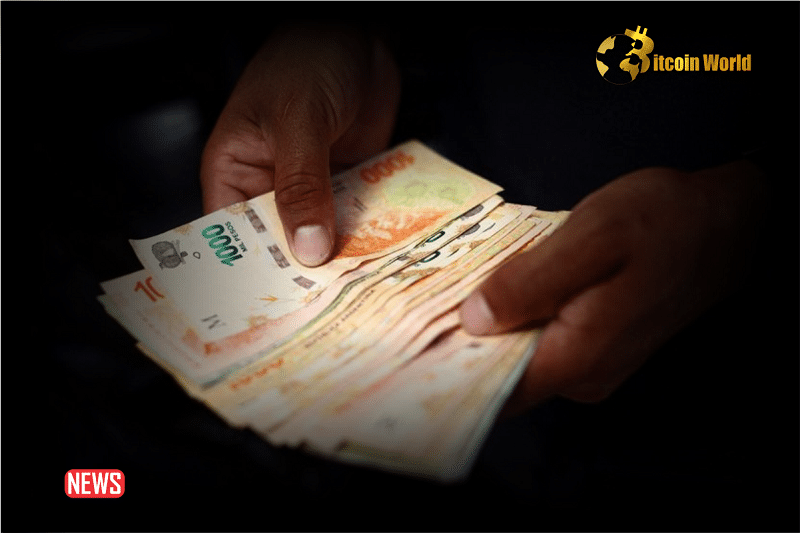Just days into his presidency, Argentina’s newly elected, pro-Bitcoin leader, Javier Milei, has already made headlines – and not entirely in the way some might have hoped. While his initial move to slash government ministries signaled a commitment to his campaign promises of economic reform, a dramatic policy shift has sent shockwaves through the nation: inflation has effectively doubled overnight. Let’s dive into what’s happening in Argentina and what it means for its citizens and the global economic landscape.
The Overnight Inflation Bomb: What Happened?
Within a mere 24 hours of assuming office, President Milei’s administration executed a significant devaluation of the Argentine Peso. The official exchange rate against the US dollar was slashed from 366.5 pesos to a staggering 800 pesos per dollar. This drastic measure, announced by Economy Minister Luis Caputo, is aimed at addressing Argentina’s deep-seated economic woes, but its immediate impact has been a sharp surge in inflation.
To put it plainly, everyday goods and services pegged to the dollar, or influenced by exchange rates, instantly became significantly more expensive for Argentinians. And it doesn’t stop there. Minister Caputo also indicated that Argentina is bracing for further monthly devaluations of 2%. This isn’t just a one-time adjustment; it’s a forecast for continued inflationary pressure.
See Also: Argentina Devalues Local Currency Peso, Is Bitcoin Adoption About To Happen
IMF Applauds ‘Bold’ Moves Amidst Rising Poverty
The backdrop to this economic upheaval is stark. Over two-thirds of Argentina’s population is already grappling with poverty. Adding to the burden, the annual inflation rate has soared to a staggering 161% as of November. This figure, the highest of the year and President Milei’s first official reading, underscores the magnitude of the economic crisis he inherited.
While the immediate pain is undeniable, Caputo and the Milei administration argue that this shock therapy is necessary for long-term economic stability. “The objective is simply to avoid catastrophe and get the economy back on track,” Caputo stated, emphasizing the dire financial situation: “There is no more money.”
Interestingly, the International Monetary Fund (IMF), often a critical voice in global economics, has publicly praised Argentina’s approach. Managing Director Kristalina Georgieva lauded the government’s spending cuts as “an important step toward restoring stability and rebuilding the country’s economic potential.”
Good call with President @JMilei today. We discussed Argentina’s economic challenges and bold policy actions to stabilize the economy and set the basis for more sustainable and private-sector led growth. We welcome these measures, as well as his commitment to strengthen Argentina’s economy. https://t.co/j1Yk4v9t0j pic.twitter.com/m6jK8khqj9
— Kristalina Georgieva (@KGeorgieva) December 13, 2023
Short-Term Pain, Long-Term Gain? The Big Question
The core question now is whether this “temporary” inflation hike, as some might frame it, will indeed pave the way for future prosperity. Argentina’s economic challenges are deeply rooted, stemming from years of mismanagement, excessive government spending, and currency controls. Milei’s radical approach aims to dismantle these structures, betting on austerity and market liberalization to steer the country towards a more sustainable path.
However, the immediate consequences are undeniable. Argentinians are facing a significant squeeze on their purchasing power. Essential goods are becoming more expensive, and with inflation projected to worsen before it improves, daily life is set to become more challenging for many.
Here’s a breakdown of the situation:
- Devaluation Impact: The Peso’s devaluation instantly increased the price of imported goods and dollar-denominated assets, fueling inflation.
- Poverty Concerns: With over 60% of the population already in poverty, rising inflation could push even more Argentinians into hardship.
- IMF Support: While the IMF praises the measures, the public sentiment within Argentina remains to be seen as the impact unfolds.
- Future Devaluations: The planned 2% monthly devaluation signals ongoing inflationary pressures, adding uncertainty to the economic outlook.
What Does This Mean for Argentina’s Future?
Argentina is at a critical juncture. President Milei’s gamble is a high-stakes one. If his policies succeed in curbing inflation in the long run and attracting investment, Argentina could potentially emerge from this crisis stronger. However, the path ahead is fraught with challenges. Public patience will be tested as living costs rise, and the success of these measures hinges on a multitude of factors, including global economic conditions and the government’s ability to maintain social stability.
For observers of the global economy and those interested in alternative financial solutions, Argentina’s experiment is one to watch closely. Will this shock therapy work? And what will be the human cost? Only time will tell if this bold, and arguably painful, economic reset will deliver the promised prosperity or lead to further instability in Argentina.
Disclaimer: The information provided is not trading advice, Bitcoinworld.co.in holds no liability for any investments made based on the information provided on this page. We strongly recommend independent research and/or consultation with a qualified professional before making any investment decisions.



